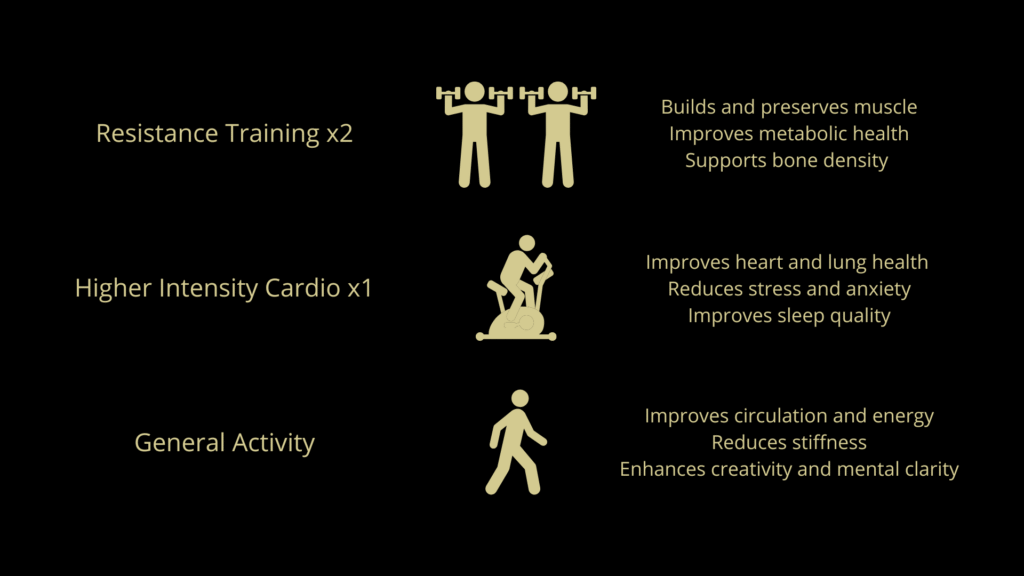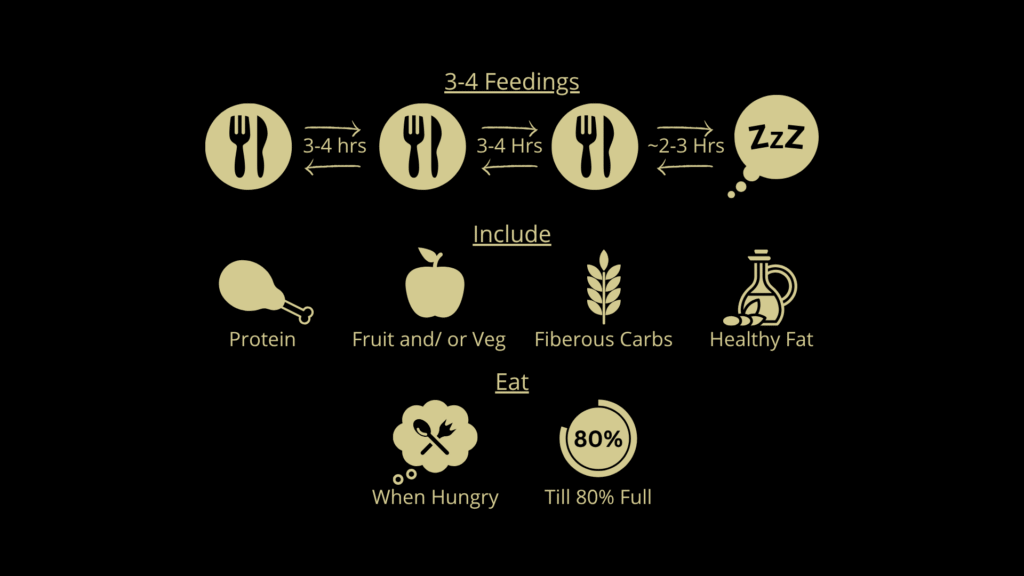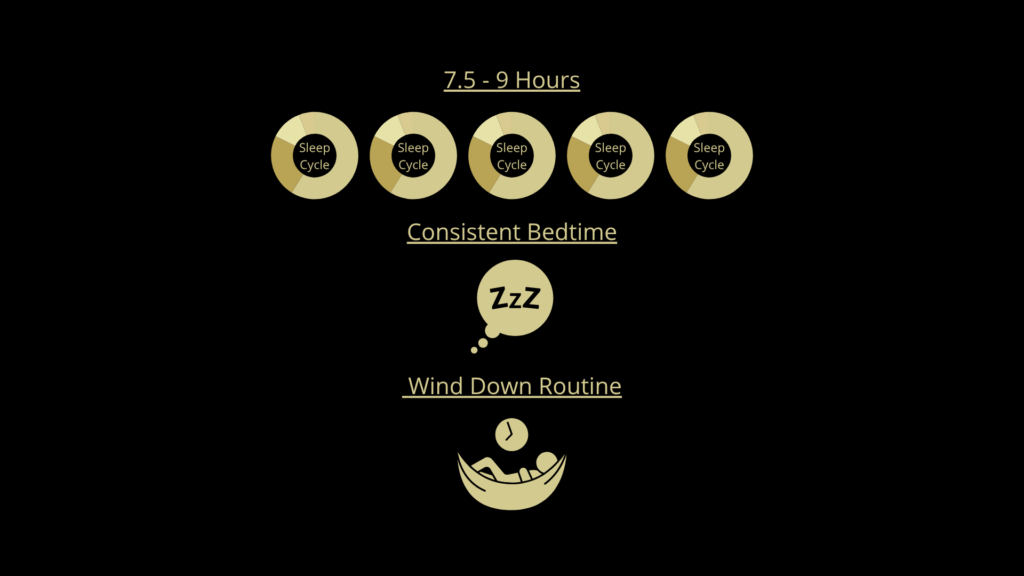Start With What Matters
We know the people we work with live full, busy lives. Over the past 13 years – working closely with clients and diving deep into the science of health – we’ve learned this:
The people who make real, lasting progress are the ones who keep things simple. They focus on doing the basics well, consistently – without letting their pursuit of health consume their whole life.
Know the Game You’re Playing
One of the hardest parts of improving your health and well-being is simply knowing what to do. It can feel like playing a game without knowing the rules – confusing, frustrating, and often discouraging.
You probably already have an idea of the outcome you want: maybe it’s weight loss, improved fitness, more muscle, or lower blood pressure. But the real challenge is figuring out how to take meaningful steps toward that outcome.
Understanding the rules of game increases motivation – because you become clear on which steps truly move the needle.
What Are We Optimising For?
Before we talk about how to get there, we need to be clear on what we’re trying to optimise.
For most people I work with – whether they’re aiming to get stronger, improve fitness, manage a health condition, recover from illness or injury, navigate menopause, or simply age well – the goal isn’t often peak performance or chasing aesthetics.
It’s something much more valuable:
To feel confident in their body
To move freely
To reduce risk of disease and decline
To live an active, capable life
And here’s the good news: you don’t need to overhaul your entire life to get there. Often, it’s a few simple (but not always easy) habits, done consistently, that make the biggest difference.
Behaviours Over Outcomes
It’s tempting to focus on the end result – losing weight, getting stronger, or changing how your body looks. But when we fixate on outcomes, we often lose sight of the bigger picture.
There are many ways to lose weight, and not all of them are healthy. Excessive exercise, starvation, laxatives – even amputation – would all move the number on the scale. But obviously, that’s not the kind of progress we’re after.
This is exactly what Goodhart’s Law warns against: When a measure becomes a target, it ceases to be a good measure.
When weight becomes the goal, it’s easy to forget what actually matters: energy, health, and quality of life.
That’s why we focus on behaviours – the daily actions that, over time, lead to meaningful, lasting change. Move your body. Eat mostly whole foods. Prioritise sleep. These are the levers that truly improve your health.
Health Is Bigger Than Food and Exercise
Of course, good health isn’t just about workouts and what’s on your plate. Mental well-being, stress, connection, environment, and more all play a role. But when it comes to physical health, three areas consistently have the biggest impact:
Exercise. Nutrition. Sleep.
These are the foundations we come back to again and again. And in the next section, we’ll walk you through the practical guidelines we use with clients to make real progress -without overwhelm or second-guessing every step.
Thrive Guidelines
Exercise

The Thrive Approach to Exercise
At Thrive, our exercise guidelines are:
2 full-body resistance training sessions per week
1 cardiovascular-focused session per week
Stay generally active throughout the day
Resistance Training
Two full-body sessions per week is often the sweet spot. It’s enough to build strength and muscle, and to see steady progress – without overwhelming your schedule.
You’re welcome to do more if you enjoy it, but two well-structured sessions work well for most.
Cardiovascular Training
One short, focused cardio session per week – at the right intensity – can go a long way toward improving heart health, fitness, and mental clarity.
Ideally, keep cardio and resistance sessions on separate days to get the most from each. But if time is tight, combining them is absolutely fine.
General Daily Activity
We also encourage you to stay generally active throughout the day, even in small ways. This doesn’t mean you need to hit 10,000 steps daily – it’s about choosing movement where you can:
A short walk in the morning or after dinner
Stretching for 5–10 minutes when you wake up
Taking the stairs instead of the lift
Standing or moving during calls or breaks
Think of it as ticking the “I moved today” box – however that looks for you.
Both structured training and everyday movement matter. It’s not about doing everything – it’s about doing enough, consistently.
Want to go deeper? Register your interest for our Exercise for Health Course, launching soon.
Nutrition

The Thrive Approach to Nutrition
Our nutrition philosophy is simple:
Eat minimally processed foods,
most of the time,
when you’re hungry,
until you’re full.
We encourage 3–4 feedings per day (meals and/or snacks), guided by hunger.
When you eat, focus on:
Protein-rich foods
Fruits and vegetables
Fibre-dense carbohydrates
Minimally processed fats
Leave around 3-4 hours between meals. This supports digestion and keeps hunger cues clear – without pushing into the kind of hunger that can lead to poor choices.
We also recommend finishing your final meal 2-3 hours before bed. This gives your body time to digest and supports a more restful night’s sleep.
Good nutrition isn’t about strict plans or calorie targets. It’s about awareness – paying attention to what and how you eat. You don’t need to track obsessively. Consistency and food quality go a long way… maybe even all the way.
Want to learn more? Register your interest for our Nutrition for Health Course, coming soon.
Sleep

The Thrive Approach to Sleep
Our sleep guidelines:
Aim for 7.5–9 hours per night
Keep a consistent bedtime
Wind down 1-2 hours before bed
Sleep doesn’t start when your head hits the pillow – it starts earlier. Dimming lights, limiting screen time, reading, or calming activities help tell your body it’s time to slow down.
To set your ideal bedtime, work backwards from your wake-up time. Getting into bed at the right time – and doing so consistently – helps regulate your natural rhythms and supports better sleep quality.
An hour or two of intentional wind-down time can make a big difference.
Want help improving your sleep? Check out our 14 Days to Better Sleep course, coming soon.
The Bigger Picture
The more people I work with, the more I’m reminded how much things stay the same – The principles of how to achieve good health remain consistent. The details, and how they’re applied, may vary, but the path is similar.
Don’t let metrics define your success. Focus on how you feel, how you function, and what you do each day.
Small, meaningful actions – repeated often – can carry you further than you think.
Managing stress, spending time with people you care about, pursuing passions, and making time for things you enjoy – these are part of the bigger picture. If you’d like to read more about how we view health and well-being more holistically, you can do that [here].
In the meantime, our simple guidelines around exercise, nutrition, and sleep offer a solid place to start.
